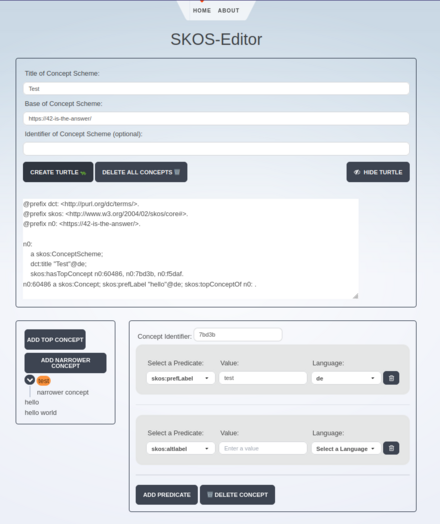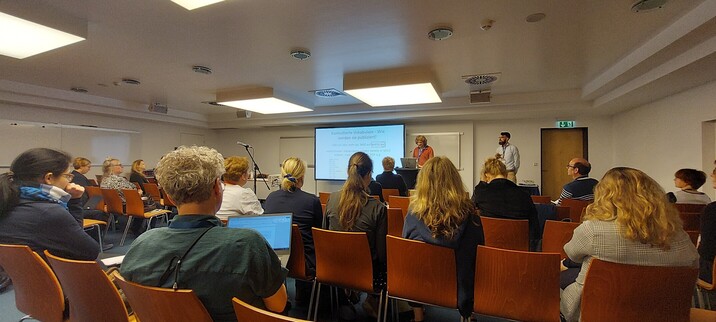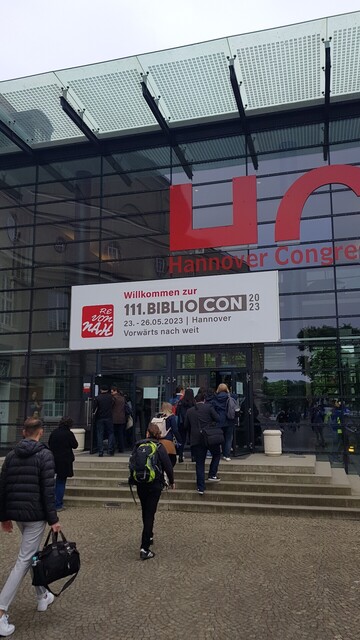SkoHub · @skohub
139 followers · 48 posts · Server openbiblio.socialWe recently have been developing a generic #SKOS #reconciliation service (still in early beta). You upload a turtle file of a SKOS vocab and get back the URL of a reconciliation endpoint. This might also come handy in different use cases presented at #swib23. @acka47 will try to give a short demo later.
SkoHub · @skohub
139 followers · 48 posts · Server openbiblio.social"Building and Deploying a Classification Scheme using Open Standards
and Free Platforms", a tutorial by @anwagnerdreas , @jorisvanzundert & Annemieke Romein that shows how to publish classification with #SkoHub and how to use the SkoHub Reconcile module (still in Beta) to integrate your classification in #OpenRefine workflows: https://doi.org/10.21825/dlh.85751 #skos
Osma Suominen · @osma
280 followers · 885 posts · Server sigmoid.socialThe automated subject indexing tool #Annif has reached version 1.0 after six years of development!
The 1.0 release signals that it is ready for production use, and that from now on, even more emphasis will be placed on backwards compatible releases to ease future upgrades. Also, there is improved CLI support, preliminary support for Python 3.11, lots of bug fixes and small improvements.
https://github.com/NatLibFi/Annif/releases/tag/v1.0.0
#libraries #machinelearning #classification #AI #subjectindexing #SKOS #code4lib
#annif #libraries #machinelearning #classification #ai #subjectindexing #skos #code4lib
Frank Förster · @FF
10 followers · 36 posts · Server openbiblio.socialIn meiner Projektarbeit für den #datalibrarian an der TH Köln habe ich eine Anfrage bei #lobid programmiert. Damit vergleiche ich den AGI- und den BGR-#Thesaurus mit der Absicht, anzureichern und auszubessern. #GND Ziel: maschinenlesbar @ BGR #skos #weiterbildung
#datalibrarian #lobid #thesaurus #gnd #skos #weiterbildung
Frederik Elwert · @felwert
991 followers · 3300 posts · Server mstdn.socialWe published a dataset paper about the #DiGA #Thesaurus for #BuddhistArt: Autiero, S., Elwert, F., Moscatelli, C., & Pons, J. (2023). The Seven Steps: Building the DiGA Thesaurus. Journal of Open Humanities Data, 9: 11, pp. 1–14. DOI: https://doi.org/10.5334/johd.111
It's great to see it out there, and we hope it encourages constructive criticism, re-use and possibly future collaborations. #Gandhara #ArtHistory #Buddhism #DigitalHumanities #LinkedOpenData #SKOS
#skos #linkedopendata #digitalhumanities #buddhism #arthistory #gandhara #BuddhistArt #thesaurus #Diga
smallcircles (Humane Tech Now) · @smallcircles
5643 followers · 3930 posts · Server social.coopChristof Schöch · @christof
1557 followers · 2134 posts · Server fedihum.org@julsraemy @quinnanya – It is available as #SKOS! https://vocabs.dariah.eu/tadirah/en/
Julien A. Raemy · @julsraemy
617 followers · 268 posts · Server hcommons.social@christof @quinnanya Could the taxonomy be published/available as #SKOS? #DH2023
BARTOC.org · @bartoc
67 followers · 23 posts · Server code4lib.socialThe Biblissima iconography thesaurus of #BNF (https://bartoc.org/en/node/20432) has been published in #SKOS this month. It is managed in a #Wikibase instance! https://data.biblissima.fr/
steffenr42 · @steffenr42
97 followers · 113 posts · Server openbiblio.socialGotta write a #skos for a client and will have to copy paste a lot from a pdf.
So I thought it's finally time for a simple skos-editor that will help me with this.
It's not working too bad, but how the f*** comes that I did not find a simple skos web editor already (or did I miss out)?
Anyways here is what it looks like now. Lots of things still missing, but PoC successfull
#rdf #bibdev #dev
Jakob Voß · @nichtich
467 followers · 999 posts · Server openbiblio.social@xenzen @acka47 @steffenr42 Wir könnten https://github.com/gbv/bartoc.org/wiki/Software-for-controlled-vocabularies ausbauen. Ich kann aber auch gerne an anderer Stelle in anderer Form sammeln. Welche Informationen pro Tool wären notwendig? #SKOS
Gerrit Gragert · @EzellaGarnie
679 followers · 692 posts · Server openbiblio.socialObwohl der Konferenzraum 27 im #HCC ganz oben ist, fühle ich mich ein wenig wie im Mission Control Raum tief unter der Erde. Mit @acka47 als Commander-In-Chief für kontrollierte Vokabularien #SKOS #Skohub #111BiblioCon
#hcc #skos #skohub #111bibliocon
steffenr42 · @steffenr42
93 followers · 103 posts · Server openbiblio.socialGestern noch nicht viel #RDF, #SKOS und dezentrale Ansätze auf der #111BiblioCon gesehen. Das ändert sich allerdings spätestens um 9:30h mit @acka47 und unserem @skohub Vortrag in Raum 27/28
steffenr42 · @steffenr42
91 followers · 98 posts · Server openbiblio.socialWer sich über #SKOS, #SkoHub oder #nostr mit mir auf der #111BiblioCon unterhalten will 👉️ ping me
#skos #skohub #nostr #111bibliocon
Adrian · @acka47
698 followers · 1919 posts · Server openbiblio.socialA recurring #LinkedData / #RDF question: In German, French and many other languages, names for roles, occupations etc. encode the genus/(grammatical) gender, e.g. "Autor"/"Autorin" for "author". Lots of controlled vocabularies contain such roles. Is there a best practice to mark different labels (m, f, gender-neutral) in RDF, especially #SKOS?
· @Sammlungsdinge
90 followers · 91 posts · Server glammr.us#ArtHK23 (@iArtHislab@twitter.com, @mPICASSOm@twitter.com). @epoz (FIZ Karlsruhe) talked about #ICONCLASS and its #SKOS-#LOD representation.
There is no easy and fully automated process to map the ICONCLASS-Codes to an #IRI-based system, especially for saints.
ICONCLASS codes are not yet fully in the #wikidata repository.
ICONCLASS #SPARQL-interface will be (hopefully) integrated into a future wikidata system – work-in-progress.
#arthk23 #iconclass #skos #lod #iri #wikidata #sparql #knowledgegraph #nfdi4culture #digitalarthistory
Jonny · @jonny
742 followers · 2563 posts · Server neuromatch.socialOK here's another half baked #MastoDev idea for #LinkedData:
a URL can be used with a preceding hashtag to refer to some specific entity, whether it's a well-defined #RDF object or not:
eg.
Banana:
#https://wikidata.org/wiki/Q503
identifiers can be given shortnames like this:
#Banana::https://wikidata.org/wiki/Q503
or with wildcards, eg. for this podcast:
#CriminalPodcast::https://thisiscriminal.com/*
so then when I search #CriminalPodcast I also get all posts that use that URL. shortnames can be retained and reused either just by the account that declared them, or by the instance.
shortnames can be used like prefixes, so eg if I do:
#schema::https://schema.org/
#skos::http://www.w3.org/2004/02/skos/core#
I can then do
#schema:Person
#skos:sameAs
So then I can declare types like this:
#schema:PodcastSeries::CriminalPodcast
and make triples like this, eg. in case someone used a different hashtag:
#CriminalPodcast::skos:sameAs::Criminal
so then when you search a hashtag, at the top you would be shown all the links that have been declared for that and who declared them, so you could eg. browse to find more things with the same type, or more hashtags that are related to each other, etc.....
#mastodev #linkeddata #rdf #https #banana #criminalpodcast #schema #skos
Koen Van Daele · @koenedaele
47 followers · 56 posts · Server hostux.socialWe just published a paper https://doi.org/10.21105/joss.05040 in @joss about Atramhasis, our #SKOS compliant #foss #thesaurus software running https://thesaurus.onroerenderfgoed.be
wobweger :verified: · @wobweger
783 followers · 2728 posts · Server mstdn.social#wroBookMark #KnowledgeGraph #rdf
#skos
The Simple Knowledge Organization System (SKOS) is an RDF vocabulary for representing semi-formal knowledge organization systems (KOSs), such as thesauri, taxonomies, classification schemes and subject heading lists.
#skos #rdf #KnowledgeGraph #wroBookMark
Donny Winston · @donny
166 followers · 202 posts · Server fairpoints.social


